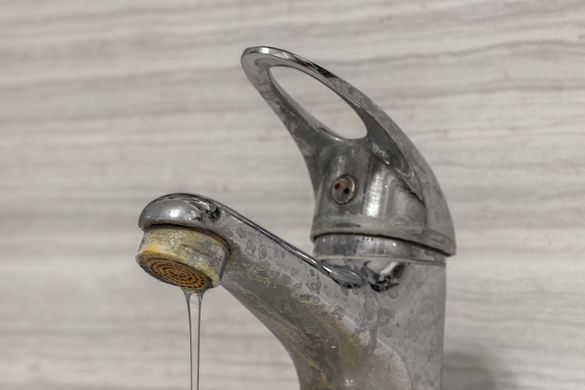 15 Feb 2021
15 Feb 2021

Bristol, - A section of carpet, a fully functioning mobile phone and bathroom taps are among the more unusual items sent through the post during tenancy deposit disputes, according to The Deposit Protection Service (The DPS).
The UK's largest protector of tenancy deposits said that it had received the carpet from a landlord wanting to demonstrate the iron burn that a tenant had left – while another sent a mobile phone complete with charger containing photos that they thought would best highlight the state of the property.
Taps have also proven a favourite according to The DPS, with a landlord posting a faucet covered in lime scale to demonstrate a tenant had not taken sufficiently good care of their bathroom; while a tenant sent in a new shower mixer tap to support an argument that their landlord was charging too much to install a replacement.
The DPS also revealed that one landlord posted a plastic bag containing wet wipes and dirt to argue the property was not clean when their tenant checked out; while another sent in a bag of sweet wrappers in an attempt to prove the tenant had children living with them.
The DPS said it encouraged the use of video and photo evidence to help resolve disputes, but that it was surprised to receive video from a tenant seeking to prove that their landlord had allowed another person to live in a concealed part of the property; and of a landlord climbing over a garden wall and entering a house without the tenant's consent.
Matt Trevett, Managing Director at The DPS said, “The provision of evidence is a fundamentally important aspect of the resolution of any dispute, and good evidence can help our adjudicators come to fair conclusions around the return of deposit money.
“Good evidence can include records of email correspondence or mobile phone messages, date-stamped photographs or video that helps demonstrate the condition of the property at both the start and end of a tenancy.
“Over the 14 years that we've been protecting deposits, landlords and tenants have posted us some very inventive and unusual items to back up their points, but we'd nevertheless encourage both parties to stick to paperwork, images and video in order to make the process as quick and efficient as possible.”
Below are The DPS' top tips for tenants and landlords navigating the claims or disputes process:
1: Check what the tenancy agreement says about repairs
Tenants should always check the agreement to understand what repairs they can make ahead of the check-out. Generally tenants who want to redecorate any or all of a property need their landlord's express permission before they start.
2: If the agreement permits, try to carry out minor and inexpensive repairs
It can be better for a tenant to do a quick and inexpensive repair, for example replacing a broken drawer handle with a matching one, rather than leaving it to the landlord, who is within their rights to claim for a contractor to carry out the work. Tenants should ensure any significant damage is repaired by trades people with the right experience and tools and ideally in consultation with their landlord.
3: Carry out repairs or cleaning before the end of the tenancy
Tenants should not rely on the opportunity to re-enter the property after they have moved out to carry out additional repairs or cleaning, as timescales for the next tenant may prevent it. Instead, they should undertake any work before they leave.
4: Take date-stamped photographs as evidence if possible
Taking date-stamped images at the start and at the end of the tenancy is the best way for a landlord to show if there has been damage or wear and tear that goes beyond what is reasonable for the length of the tenancy. If that is not possible they should still send images to enable adjudicators to check for date information inside the file.
5: Avoid emotive or abusive language when describing evidence
Keep evidence descriptions professional and neutral, for example, avoid using words such as 'filthy' or 'disgusting' and avoid derogatory or sarcastic remarks. If the disagreement reaches the dispute stage, evidence could be shared with the tenant or landlord, potentially escalating tension and prolonging any disagreement.
6: Be honest with yourself about the original condition of the property before making a claim
It can be difficult for landlords to remember a property's original condition, especially if rented for several years or if successive tenants have lived in it. Older-style properties can be clean on check-out but still have dated decoration or older items that may have deteriorated over time. Likewise tenants should be prepared to accept reasonable deductions proposed by landlords if they have not met their obligations set out within the tenancy agreement.
For more information on how to have a smooth check-out, see: https://depositprotection.com/learning-centre/disputes/
ENDS
For any media enquiries
Sarah Chidgey
PR Manager +44 (0)370 702 0003 x1534
sarah.chidgey@computershare.co.uk
Notes
1. For high resolution images of spokespeople, visit http://cpu.vg/spokespeople.
About The DPS
The Deposit Protection Service's custodial tenancy deposit protection scheme is accredited by the Government. It is provided free of charge, and funded entirely by the interest earned from deposits held in the scheme. The DPS was approved by the UK government to run an insured TDP scheme in September 2012 in addition to the approval it has already been granted by the UK government in respect of the custodial scheme. The DPS is run by Computershare Investor Services PLC. Online self-service allows landlords to register and make deposit payments, transfers and repayments 24 hours a day. Help and advice is available through a dedicated call centre during office hours. An impartial Dispute Resolution Service, helps to resolve any disputes quickly and without the need for court action.
For more information, visit www.depositprotection.com.
About Computershare Limited (CPU)Computershare (ASX: CPU) is a global market leader in transfer agency and share registration, employee equity plans, mortgage servicing, proxy solicitation and stakeholder communications. We also specialise in corporate trust, bankruptcy, class action and a range of other diversified financial and governance services.
Founded in 1978, Computershare is renowned for its expertise in high integrity data management, high volume transaction processing and reconciliations, payments and stakeholder engagement. Many of the world's leading organisations use us to streamline and maximise the value of relationships with their investors, employees, creditors and customers.
Computershare is represented in all major financial markets and has over 12,000 employees worldwide.
For more information, visit www.computershare.com
Computershare Investor Services PLC is authorised and regulated by the Financial Conduct Authority, Registered Office: 12 Endeavour Square, London, E20 1JN. Computershare Investor Services PLC is on the Financial Conduct Authority Register with registration number 188534. Computershare Investor Services PLC is registered in England & Wales, Company No. 3498808, Registered Office: The Pavilions, Bridgwater Road, Bristol BS13 8AE. The main business of Computershare Investor Services PLC is the provision of share registry and shareholder services.
Please visit the following website to read the Computershare legal notice: http://www.computershare.com/disclaimer/emea


